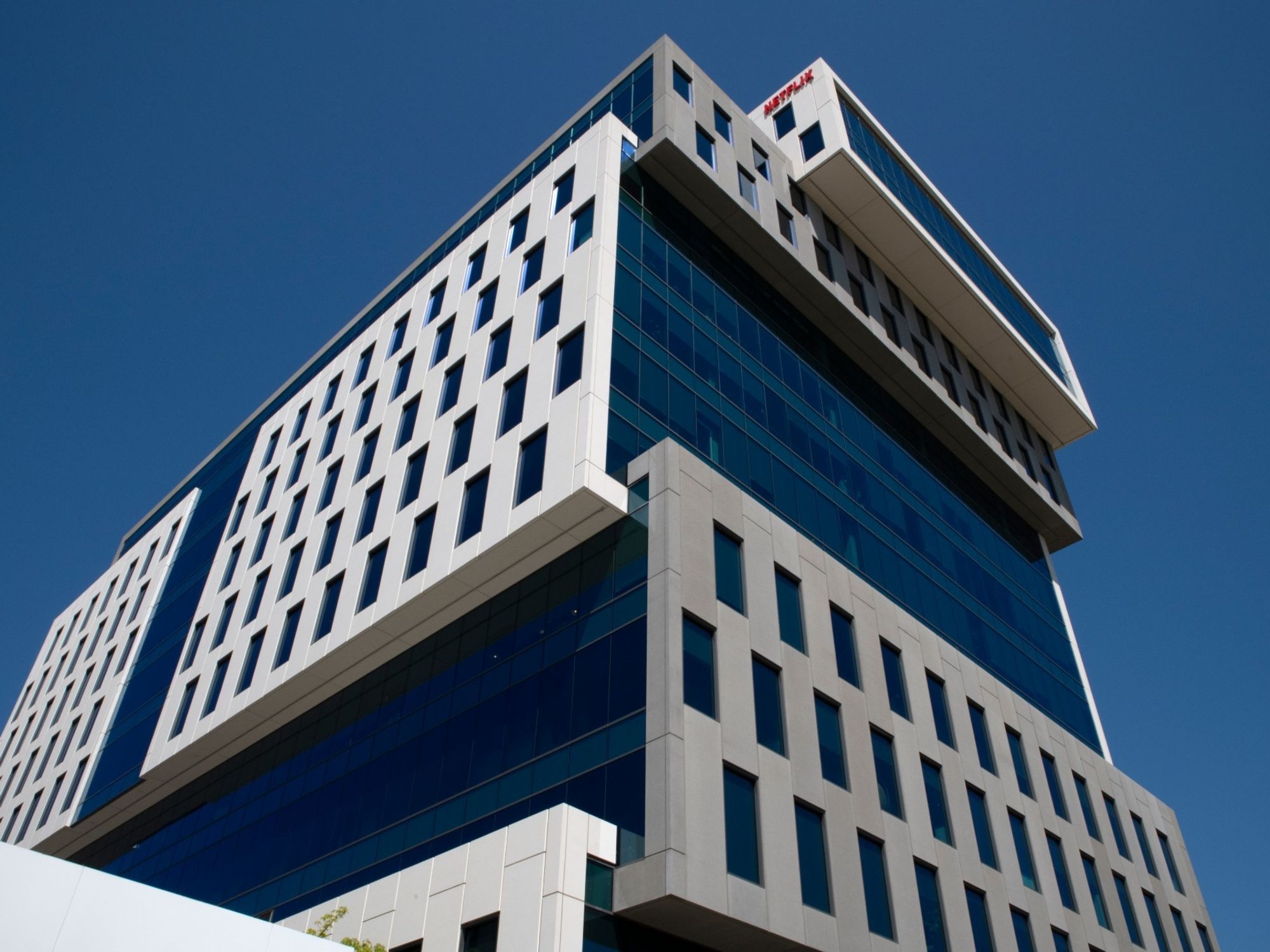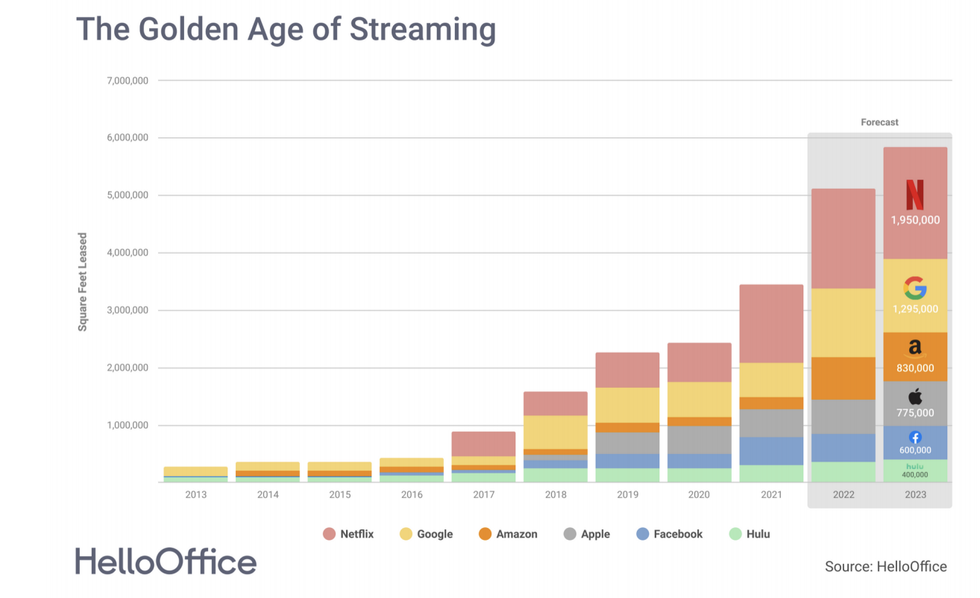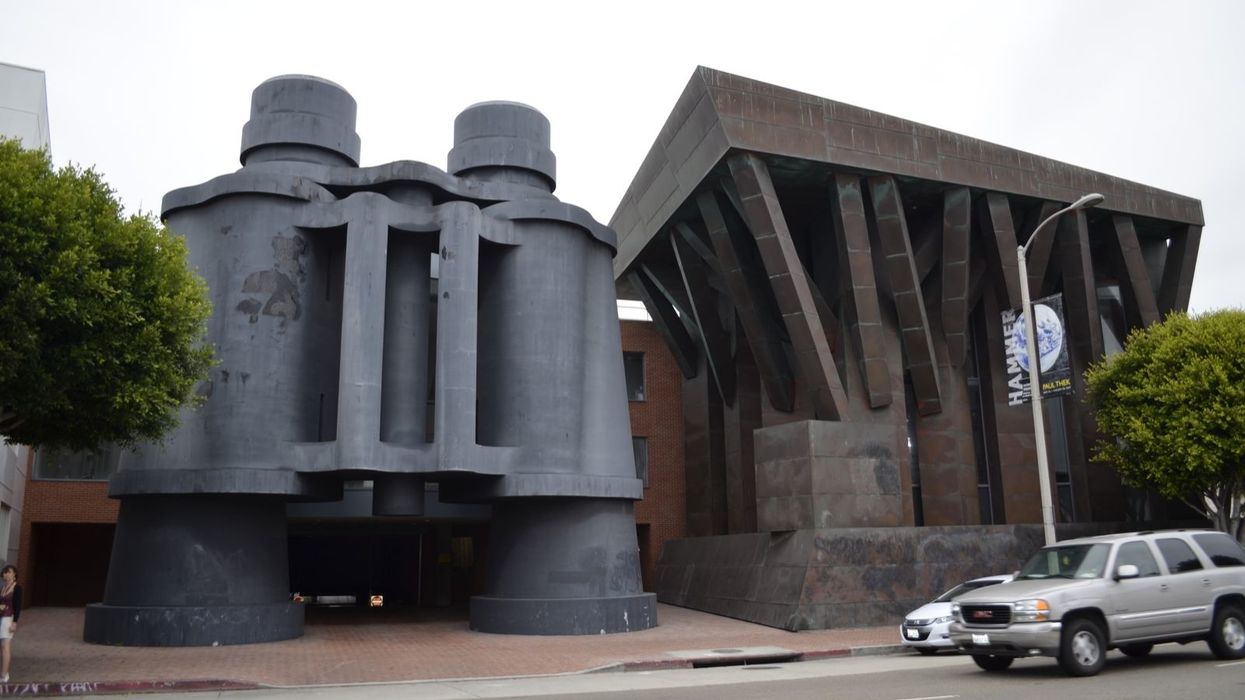Netflix and Google Are Poised to Dominate L.A. After the Pandemic
Ben Bergman is the newsroom's senior finance reporter. Previously he was a senior business reporter and host at KPCC, a senior producer at Gimlet Media, a producer at NPR's Morning Edition, and produced two investigative documentaries for KCET. He has been a frequent on-air contributor to business coverage on NPR and Marketplace and has written for The New York Times and Columbia Journalism Review. Ben was a 2017-2018 Knight-Bagehot Fellow in Economic and Business Journalism at Columbia Business School. In his free time, he enjoys skiing, playing poker, and cheering on The Seattle Seahawks.

In the next few years, as the world emerges from the novel coronavirus, Netflix will lay claim to nearly as big a footprint in Los Angeles as the most iconic of the city's entertainment companies, Disney. Google, another Silicon Valley implant, will not be far behind.
The pandemic will delay some expansion but likely not diminish it because increased time at home is only increasing the popularity of streaming, and the crisis is expected to make tech giants even more dominant.
Though it is officially headquartered in Los Gatos, Netflix is increasingly -- for all intents and purposes -- an L.A. company, a quick rise considering it had little presence in the city before 2017. The streaming giant has already signed commitments for an additional 826,000 square feet of office space and sound stages in Hollywood, meaning that it will have twice the footprint in L.A. as in the Bay Area. Already, Netflix has more than 3,000 employees here, considerably more than it has at headquarters, according to someone familiar with the company.
All together, the so-called FAANG companies – Facebook, Apple, Amazon, Netflix, and Alphabet (formerly known as Google) plus Hulu – will occupy nearly six million square feet of office space on the Westside by 2023, gobbling up 10% of all commercial real estate there. The figures come from a review compiled for dot.LA by the tech office broker HelloOffice, which uses proprietary data to track real estate listings and trends in real time. (None of the companies would comment on their real estate activity.)

The analysis reveals that a city known globally as the movie capital of the world for the last century has rapidly transformed itself in just the few years to be the streaming capital. They also show the increasing influence of the biggest tech behemoths in L.A. and the extent to which scores of smaller but still significant players are forming an expansive reach over the area; almost half the tenant base on the Westside is made up of companies combining technology and entertainment.
"Tech has now become the bedrock of Los Angeles," said Petra Durnin, head of market analytics at HelloOffice. "Every kind of industry has a tech component."
It might seem incongruous to be talking about office space at a time when nearly every workplace sits empty as employees stay quarantined at home. But while more work will be remote, experts predict most people will return to the office, eventually. A recent study by the University of Chicago found only a third of work could be done remotely. "We will get back to business but with necessary adjustments," Durnin said.
FAANGs are expected to come out stronger on the other side of the crisis as many less-capitalized businesses go under. Meanwhile, stuck at home with little else to watch with sports and live events on hold, people are binging shows like Tiger King and Ozark at record rates. "Like other home entertainment services, we're seeing temporarily higher viewing and increased membership growth," Netflix recently told shareholders, after announcing 15.8 million new subscribers in the last quarter, more than double what it expected.
Rapid growth expected to continue
Google is emblematic of the trend of the last decade that is expected to accelerate, tech giants constantly outgrowing ever bigger L.A. offices.

The search giant had a small presence in Los Angeles starting in 2003, but its first major office did not open until 2011 in Venice. It quickly outgrew the trendy 100,000 square feet Frank Gehry-designed offices there and expanded a short distance south to Playa Vista, snapping up 12 acres of vacant land for $120 million in 2014. In 2018, the company moved into a vast four-story, 450,000 square-foot hangar where Howard Hughes built the Spruce Goose during World War II. Last year, Google signed a 14-year lease to take over 585,000 square feet of office space at a transformed Westside Pavilion, starting in 2022. It will be the company's third L.A. campus.
Meanwhile, Amazon and Apple have staked claims on Culver City, which for the last century has been dominated by movie studios MGM and Sony Pictures Entertainment. It's as stark an illustration as any of the transformation from film to streaming.
In 2018, Amazon announced it was leasing 530,000 square feet at a revamped Culver Studios, scheduled for completion next year. Apple has said it expects to have 1,000 employees in Culver City by 2022, working on the company's increasingly important entertainment properties such as Apple TV, Apple Music, and Apple Podcasts. Before the pandemic, the company had started moving employees in stages to a sleek new 125,000 square foot complex next to the Expo Line, a move that is expected to resume when employees are allowed to return to work.
The coronavirus will also delay major expansions from Facebook and Netflix.
The social network was due to move into new offices in Playa Vista this year while the streamer was preparing to move into two large offices in Hollywood that total nearly 700,000 square feet.
Facebook CEO Mark Zuckerberg said last week that the company would begin to open its offices July 6, though any employee who wants to can continue working remotely through the end of the year. Google CEO Sundar Pichai told employees that some essential workers can return in June but the majority who can work from home will likely do so through 2020.
"The stay-at-home mandate has dampened some companies' immediate plans for expansion and construction delays could push some move-ins to mid 2021, but collectively these companies are still expected to occupy an additional one million square feet over the next one to two years," said Durnin.
- netflix - dot.LA ›
- Netflix's $100 Million Relief Fund: How It Started and Where It'll Go ... ›
- Netflix Buys Hollywood's Egyptian Theater for Premieres - dot.LA ›
- TrueCar lays off 40 percent of staf - dot.LA ›
- George Floyd Protests: L.A.'s Tech Community Reacts - dot.LA ›
- Tech Refugees Are Moving to LA During the Pandemic - dot.LA ›
- Los Angeles Tech and Startups 2020 Year in Review - dot.LA ›
- Los Angeles Commercial Rents Are Higher Than Before COVID - dot.LA ›
- As the Pandemic Recedes, Get Ready for Office Awkwardness - dot.LA ›
- Netflix Opens an Online Shop, Taking a Page from Disney - dot.LA ›
- Netflix Growth Stalls in the U.S. and Canada - dot.LA ›
- Google Sued for Alleged Sexual, Racial Abuse - dot.LA ›
- Netflix Could Acquire Roku - dot.LA ›
- Apple And Google Plan To Open New Offices In West LA - dot.LA ›
Ben Bergman is the newsroom's senior finance reporter. Previously he was a senior business reporter and host at KPCC, a senior producer at Gimlet Media, a producer at NPR's Morning Edition, and produced two investigative documentaries for KCET. He has been a frequent on-air contributor to business coverage on NPR and Marketplace and has written for The New York Times and Columbia Journalism Review. Ben was a 2017-2018 Knight-Bagehot Fellow in Economic and Business Journalism at Columbia Business School. In his free time, he enjoys skiing, playing poker, and cheering on The Seattle Seahawks.



 Image Source: Revel
Image Source: Revel
